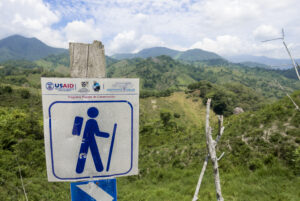Washington, D.C.-Today, the Washington Office on Latin America (WOLA), along with more than 400 other organizations, academics, and individuals from both the United States and Colombia, sent a letter to the U.S. Congress asking representatives to vote no on the pending U.S.-Colombia free trade agreement (FTA). Human rights violations in Colombia – abuses against labor activists, Afro-Colombians, human rights activists and others – continue to take place at alarmingly high levels. In this climate, it would be a mistake to approve the FTA.
Human rights abuses are widespread and touch many sectors of Colombian society. The Labor Action Plan approved several months ago by the Colombian government in discussions with the United States has not stopped new violence directed against trade unionists and labor activists, nor has it banned the third-party contracting that obstructs workers’ ability to unionize. Colombia’s internal armed conflict is generating violence and new displacements. Illegal armed groups exert influence, often through violence, over legal sectors of the economy including extractive industries, oil palm, mining, and development projects. Given the continuing climate of human rights abuses, approving the FTA on the grounds that the first formal steps in the Labor Action Plan have been implemented, ignores the deeper issues, and by doing so will contribute to further violence and displacement.
The Obama Administration has been very focused on addressing labor concerns with the U.S.-Colombia Labor Action Plan; WOLA recognizes these efforts. Nonetheless, it joins over 400 U.S. and Colombia civil society groups in recognizing that much more needs to be done to address labor rights and the broader human rights situation. The Plan fails to take into account the country’s broader context and issues that generate violence against workers, human rights defenders, and activists. In 2011 alone, more than 20 human rights defenders have been killed and approximately 100 threatened.
WOLA’s “Workers without Rights” highlights the situation of labor rights abuses. These videos by the U.S. Office on Colombia provide testimony from Colombia on the impact of the FTA on small-scale farmers and workers, in addition to Afro-Colombian and indigenous communities.
“I’ve spent the past six weeks writing obituaries of labor activists, land-rights defenders, and Afro-Colombian and indigenous leaders. The rhetoric about improvements in labor and human rights does not measure up with the violent reality on the ground,” said Gimena Sanchez, WOLA Senior Associate for the Andes. “If the U.S. Congress does not focus on the human rights issues, including fully dismantling the illegal armed groups and taking bold steps to protect Afro-Colombian and indigenous collective rights before passage of the FTA, it will facilitate the onset of new human rights violations and displacements,” she adds.
With over 5.2 million persons internally displaced (IDPs), Colombia competes only with the Sudan for the country with largest total IDP population in the world. Threats, attacks, murders, and new displacements of human rights defenders, Afro-Colombian, and indigenous leaders continue to be a serious problem. Armed combat continues, successor paramilitary groups remain unpunished, and justice for human rights cases remains elusive. Last week, Afro-Colombia IDP activist, Ana Fabricia Cordoba, was murdered in Medellin despite having repeatedly denounced threats and even publicly calling for protection from officials.
“We’re pleased to see Colombia generating new laws and policies; but approving new laws is far easier than implementing them,” said Geoff Thale, Program Director at WOLA. “It is too early for the U.S. to declare victory in Colombia and move forward on this FTA. Results are needed.”

